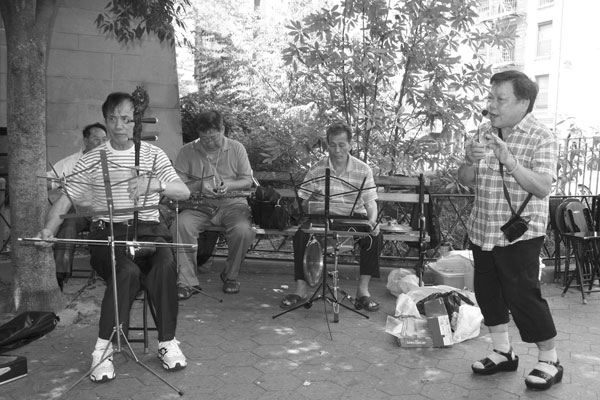
BY ALINE REYNOLDS | Some Chinatown residents have had it with the loud, live music streaming out of Columbus Park on the weekends.
Several music and dance groups entertain scores of tourists and local senior citizens with Cantonese opera tunes on Saturdays and Sundays. The groups amp up the sound using microphones and loudspeakers, competing with each other to try and attract as many passers-by as possible. Some of the groups lack the proper city permits to perform at all.
For the musicians and dancers, performing in the park is a beloved pastime. For some nearby residents, however, the makeshift concerts have become a major disturbance to their once-peaceful weekends. So much so, that there was discussion at a Community Board 3 meeting late last month to temoprarily deny the performers sound permits altogether. In order for a performer to use an amplifier or any type of loud speaker, a special permit is required.
Ralph Musolino, NYC Department of Parks and Recreation’s Manhattan Districts One and Two Manager, met with C.B. 3 in late June to discuss the issue.
“It looks like the groups are vying for certain areas of the park, and they’re trying to outdo each other,” said Musolino. “So instead of [one group] having a louder system than another, we thought, ‘why don’t they just all be on equal footing and play without the amplification?’”
For the time being, Musolino said he would be limiting the number of permits he approves. A sound permit combined with a special event permit costs $70 per gig. Musical groups that host events with 20 or more people are required to have “special event” permits.
“I try not to give out several [permits] for the same day, because it’s going to be an issue,” said Musolino.
The police have been more strictly enforcing the rules by handing out summonses and fines to violators in response to noise complaints. This practice resulted in the the arrest of Street Musical Club musician Yi Zhuo Wu in early May who was performing without a sound permit. Neither Wu nor other opera performers were available for comment.
Some fear that stepped-up enforcement of the city’s permit laws will curb spontaneous performances in the park. “My [opinion] is, if they decide to come down hard to make them do permits… either the Chinese will stop doing what they love in the park, or they’ll risk arrest,” said East Broadway resident and park user Rima Strauss.
As a compromise, the Parks Department has agreed to arrange a Columbus Park concert for the fall, in which all of the ensembles would be able to perform using amplification. “It’ll bring them together, so they can meet each other and make sure they’re all on the same page,” said Musolino. “We’re going to try to see if we could do it several times [moving forward].” The city would give community members plenty of advance notice about the concerts, so the event doesn’t come as a surprise to nearby residents, Musolino said.
This solution, however, did not sit well among some community members that are still hoping for a complete hiatus from the amplified music, such as Virginia Wong, former vice president of Friends of Columbus Park. The music awoke her at 6 a.m. on a recent Saturday, when she was staying at her family’s apartment on Mulberry and Bayard Streets. Wong said she has filed several complaints with the fifth precinct and 3-1-1 about the amplified noise.
“They always want to come back [to the same corner of the park] because they want to show off,” said Wong. “When they do that, they should consider the other people living around here.”
When it comes to permitting, the woman said, “They should listen to the government and obey the rules.”
Karlin Chan, whose Mulberry Street apartment faces Columbus Park, said the noise has become unbearable. He shuts his double-paned windows once a performance begins, but still has trouble hearing his television.
“You can have fun, but you don’t need to put concert-sized speakers out there,” said Chan. “I listen to opera occasionally, but I can’t be force-fed. They just have no concern about the residents.”
Even some of the park’s regulars are complaining. Wee Wong, a member of the Lin Sing Association, a neighborhood organization, said he no longer jogs and reads in the park because he can’t stand the music. “These opera groups are ridiculous… they make too much noise,” he said. “I’m against all these people using it for their own purposes… the park is for everybody.”
The groups, Wong said, should perform at the Chinese Consolidated Benevolent Association and other local community centers. Neighborhood seniors, however, contend that the park has become their preferred social hub and a place where they can find free entertainment.
“I have a lot of friends here… I get very lonely at home,” said nearby resident Wai Mui Yit, who frequents the park every weekend.
“We like to come to the park so we can enjoy the music,” said Lower East Side resident Katie Leung. “It makes us happy, which is good for the health.”
Leung defended the groups’ use of amplification. “If it’s not loud enough for us,” she said, “what’s the point?”
District One Councilmember Margaret Chin said she is working with the city and her constituents to find solutions to the problem. “The community relies on the park as a ‘living room’ of sorts. It is where generations of residents have socialized, met, and enjoyed the outdoors,” she said. “But use of the park needs to be fair and equal for all — for [both] area residents and those who come to the park to perform.”






























